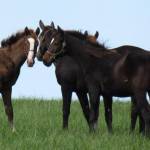Vitamin K: Essential for Bone Development in Horses

Vitamin K is not one vitamin, but a group of substances with similar structures and actions. Vitamin K1(phylloquinone) is found in grass and other green, leafy plants, while vitamin K2 (menaquinone) is synthesized in the horse’s digestive tract.
Though it is abundant in fresh forage, vitamin K1 is quickly degraded by sunlight after grass is mowed for hay. Sun-dried hay may lose up to 70% of its vitamin K1 content after being exposed to light for only seven hours, so horses without access to fresh grass may need supplementation of this nutrient.
Synthesized vitamin K2 may not be absorbed well from the digestive tract for several reasons including hindgut acidosis caused by a diet that includes large grain meals. Warfarin, sometimes used in the treatment of navicular disease, limits the absorption of vitamin K, as does the presence of coumarin found in moldy hay or haylage containing sweet clover.
Vitamin K is necessary for the proper clotting of blood, a process that uses calcium. Another calcium-related function of vitamin K is its role in bone and cartilage metabolism. If vitamin K is in short supply in the horse’s body, it is first used to guarantee that the clotting factor is supplied. For this reason, it is thought that any deficiencies may short-change use in bone metabolism.
Many factors affect bone metabolism and skeletal problems such as osteochondritis dissecans (OCD), fractures, and bucked shins in racehorses. Research carried out in Australia has suggested that vitamin K status should also be considered in the analysis of bone disorders.
One study involved yearlings with or without bone lesions identified by radiograph. Yearlings without lesions showed a higher bone mineral density compared to those with one or more lesions. Yearlings with lesions also had significantly lower levels of circulating carboxylated osteocalcin compared to yearlings with no lesions.
Osteoblasts (bone-forming cells) synthesize osteocalcin, which is necessary for binding calcium, a step in bone mineralization. Glutamic acid, an amino acid important in bone formation, produces residues that are activated, or carboxylated, in the presence of vitamin K. The efficiency with which osteocalcin binds calcium will be reduced if vitamin K status is low when this activation takes place.
Another study showed improved bone density in two-year-old Thoroughbreds supplemented with a water-soluble bioavailable form of vitamin K. In a control group of horses that were in training but did not receive vitamin K supplementation, bone density increased to a lesser degree than in supplemented horses.
The same form of vitamin K was used in a group of horses with OCD lesions, and lesion scores improved after three to seven months of supplementation.
These results suggest that vitamin K supplementation might be helpful for young horses that do not have access to fresh pasture and/or are fed large grain meals, putting them at an increased risk for hindgut acidosis.








